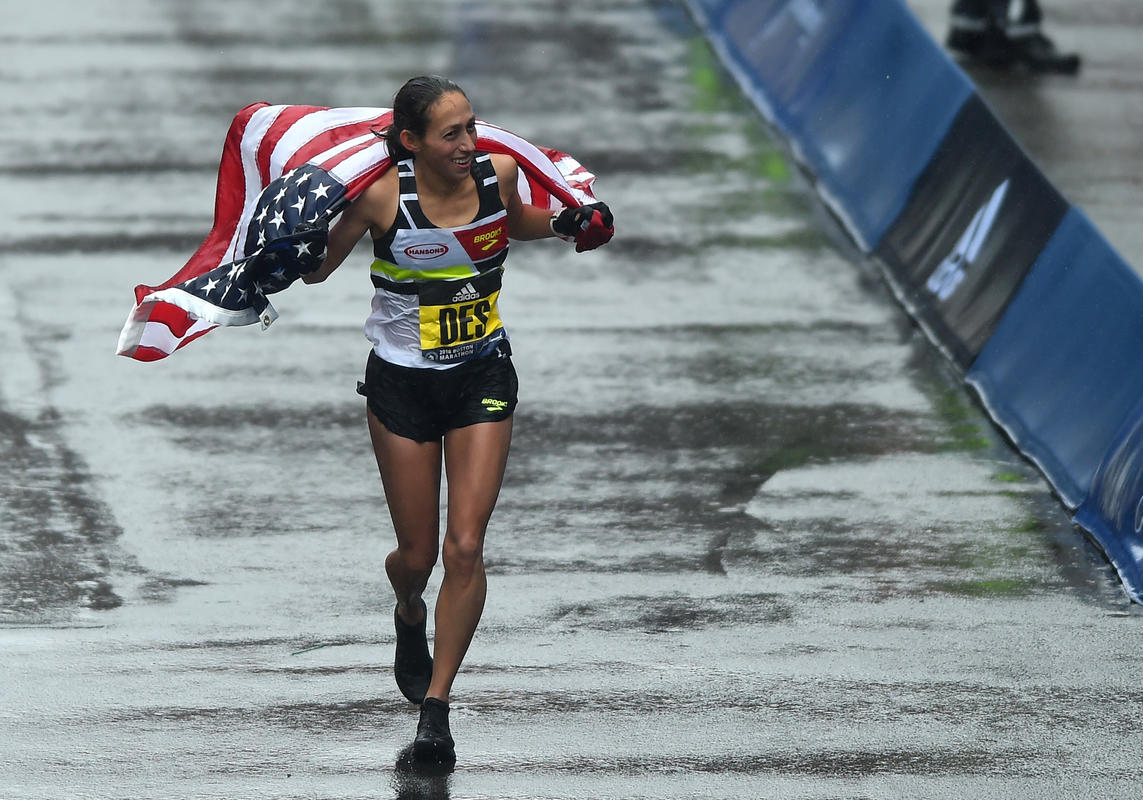
By Mike Rowbottom |
In the blizzard of approbation for Desiree Linden’s belated, unlooked for and loveable victory in Monday’s windswept, rainswept Boston Marathon, a snowflake tweet landed on my nose.
It came from Rich Kenah.
In 1996 Kenah, a leading United States middle distance runner, narrowly failed to make the team for that year’s home Olympics in Atlanta. He’d missed the carnival.
The following year he earned 800 meter medals in both the World Indoor and Outdoor Championships and set a seriously good personal best of 1:43.38 at the Zurich meeting as – or rather, slightly later than – Wilson Kipketer of Denmark made the world record his own by clocking 1:41.24.
“The best thing that happened to me was Wilson Kipketer,” Kenah, who would go on to qualify for the 2000 Olympic Games in Sydney, later reflected. “He took the race out hard and I knew most people would come back to me.
“So that day I had the following: Two years of healthy, uninterrupted training, lingering disappointment [from] not making the 1996 team, a keen sense of what my fitness was and where my breaking point would be, [and] Wilson taking the sting out of everyone else’s legs.”
In the wake of Linden’s home run in the rain to become, at 34, the first American woman to win this race since she was a one-year-old, Kenah – now executive director of, ironically enough, Atlanta Track Club – tweeted the following, accompanied by the picture of the winner powering through the blue finish tape on a road teeming with water:
“A US Olympic reporter once told me, ‘Sometimes success is delayed for people who do it the right way. But when that moment arrives, it makes all the pain, frustration and sacrifice worthwhile.’ May I present Exhibit A.”
Would Linden have won if the race had been run in normal conditions? Impossible to answer – but while there had been a home buzz about this women’s race, and a strong feeling that the drought would be ended, the expectations lay with runners such as United States 10,000m record holder Molly Huddle, third in New York City on her marathon debut in November 2016. Or Linden’s sometime Olympic marathon colleague Shalane Flanagan, who last November became the first American woman to win the New York CIty Marathon in 40 years.
Not that Linden was an unregarded rookie, of course. This was her 15th marathon. She raced in both the 2012 and 2016 Olympic Games in London and Rio de Janeiro. And seven years ago she missed victory in Boston by two seconds as she finished behind Caroline Kilel of Kenya. Two seconds. Seven years…
Kenah’s mention of sacrifice was even more to the point given the way Linden had proceeded in the early stages of a race that she hadn’t even felt confident of finishing.
For Flanagan, flagging in the rain and freezing wind, she turned domestique, shielding her from the worst of the weather in an attempt to get back to the leading peleton. When Flanagan needed to go to a portaloo, she slowed and awaited her return. And later she briefly performed the same cycling team duties in an effort to help Huddle – before finding the legs to actually win the Tour de Force. A result much to be Desireed…
On a chill day, it was a performance that went beyond athletic, and followers of the sport will find it an enduringly warming memory.
There was footage on Twitter later this week of Linden, surrounded by friends, drinking champagne from a running shoe before turning towards the flashing smartphones around her with a wolfish grin, stray drops coursing down her chin like, well, Boston rain.
Ideally the shoe should have been made out of glass…
Slightly less than a day earlier, in weather that could not have been more different from that which engulfed Boston, a Scotsman subsided to the road just over a mile from the finish line of the Commonwealth Games marathon in Gold Coast, his lead more than two minutes, his legs, in the stifling heat, unable to take him any further.

Callum Hawkins wouldn’t have wanted it this way, but he will always be remembered for this race – not just for his agonized, and agonizing, collapse, but the way in which, sensibly or not, he had earlier picked himself from a first fall and battled on over Sundale Bridge before hitting, not the Wall, but the curb.
At such moments the mental power required and accessed by elite athletes is awfully revealed. For Hawkins, at that point, an awesome will to achieve was the last thing to shut down. Jim Peters may have reached the stadium before his own heart-rending collapse at the 1954 Vancouver British Empire and Commonwealth Games, and his lead may have been even greater, at 17 minutes. But the dread dynamic of the elite performer was identically demonstrated.
The athlete stricken on Sunday is just 25. He finished ninth in the Rio 2016 marathon. Last year in London’s World Championships he was one place off the podium, equaling the best ever performance by a British runner in that event.
Kenah’s words were prompted by Linden. They should be heeded by Hawkins.
Republished with permission from insidethegames.biz.